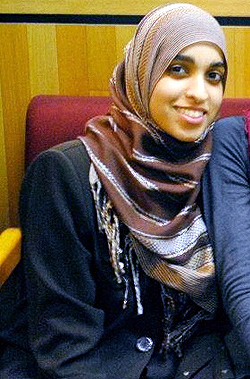Aisha Faruqi says traditional head covering opens doors to conversation on campus

Today the Rutgers’ School of Engineering junior embraces the hijab with full conviction as part of her faith. It also serves as a conversation starter and as tool for sharing that faith with curious friends and faculty members on campus.
The role is a natural outgrowth for Faruqi, education outreach head for Rutgers’ Muslim Student Association, who with other members is deep into planning this year’s Islam Awareness Week on the College Avenue Campus. Each of the major Rutgers campuses has its own similar group for Muslim students. They are separate organizations, but work together on events, Faruqi says.
From April 9 to 13, the association will set up shop in a tent outside of Brower Commons, providing brochures, games, and snacks as it tries to clear up what Faruqi sees as the many myths and misconceptions surrounding the 1,400-year-old religion.
“When you see a Muslim, many times you think of terrorism, and that’s the stereotype we want to do away with,” says the civil engineering major from Jackson. “Islam is a compassionate religion. It tells us how to treat our neighbors and how to help our communities. It’s a faith of reason and logic.”
Faruqi has found Rutgers to be a welcoming place for Muslims, an environment that encourages a spirit of openness and questioning. Although her hijab and the accompanying layers she wears with it may initially cause awkwardness among the uninitiated – “They see it and may be afraid to approach me,” she says – Faruqi is more than happy to share the garment’s purpose and why she chooses to wear it.
“The main reason is to please my creator – he has commanded me to wear it,” she says first and foremost. Beyond that, the covering provides a sense of modesty for the wearer, along with protection against being seen in a sexualized, depersonalized way.
“People who see me in the hijab aren’t going to view me as a body, but will look at my intellect and my humanity,” Faruqi says. “It speaks to the world about the way you conduct yourself.”
What it doesn’t do, she stresses, is create a dynamic in which men are superior to women. That’s another widely held misperception about her faith that she’d like to lay to rest, Faruqi says: “People think Muslim men can beat their wives, and that’s just not true. Men and women are viewed as equal in God’s eyes, but they have different roles.”
Faruqi transferred to Rutgers last year from the New Jersey Institute of Technology and quickly became involved with the Muslim Student Association. She acknowledges that the terrorist attacks of September 11, 2001, created widespread distrust of Muslims, but believes that the day also opened many Americans’ eyes – in a positive way – to the tenets of a religion they previously knew very little.
Sparking dialogue is what Faruqi is all about, whether it’s among students who pass by the tent at Brower next week, or the 250 Muslims, Jews, and Christians who came together in January for a lively interfaith panel at the Rutgers Student Center.
Convened by the Muslim students’ group, Rutgers Hillel and Ratio Christi, the event kicked off a series of five sessions designed to promote understanding among university students.
The theme of this year’s awareness week – the eighth to be held at Rutgers – is “The Struggle for Humanity.” Events will include four evening talks devoted to domestic violence, racism, poverty, and human rights, focusing on Islam’s contributions to each of those fields as well as the guidelines the Quran sets out for believers.
“People misunderstand so much of what Islam is all about,” Faruqi says. “We just want a voice in society. We want people to know that Islam offers a message that can apply to everyone at all times.”